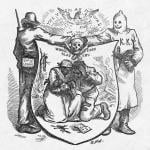Sound like any other Luther you know? Sound like any doctrine you know? Anyway, as we said yesterday, Jordan Ballor has an article in Cardus arguing that the series is, in fact, Lutheran. I’ll let him tell you about a story line:
John Luther’s willingness to suffer, to be despised, and even to be killed for the sake of others is manifest throughout the series. In a line of work that is characterized by the daily risk of life and limb, the risks Luther takes on a regular basis are foolhardy, at best. When Jenny Jones’s mother, with whom Luther has a complicated history, comes calling, Luther finds himself unable to follow his safer judgment and remain uninvolved. He feels responsible in some way for the plight of Jenny, who after her father’s death has become addicted to drugs and a victim (“actress” seems like the wrong word) in the pornography business.
Luther ventures onto the set just as filming is about to begin and (to put it delicately) “removes” Jenny from the situation. He follows through and delivers Jenny to her mother, and the task he had been asked to complete has been finished. But everything is not well. Jenny knows that living with her mother will not be healthy. She knows she needs help and she pleads with John to help her. Again, despite his “better” judgment, Luther cannot resist helping. He cannot bring himself to simply tell her, “Go and sin no more,” and leave it at that. John Luther is thus in a very real way a natural lawman. His innate sense of justice and of obligation is so deep that he simply cannot stand by and leave broken things alone. He has to try to help, even if it means risking his reputation, his livelihood, and indeed his life.
He ends up risking all three in Jenny’s case. Those who run the porn ring have orchestrated the whole arrangement in order to get Luther into a position where he is exposed and compromised. At one point the gangsters nail Luther’s hand to a table: Luther is literally pierced for Jenny’s transgressions. He has put himself in this position willingly, knowing what it might cost. In the process, the gangsters do end up getting some leverage on Luther so that he has to appear to do their bidding, at least for a time.
To Luther’s colleagues, Luther seems to have been compromised. When DS Erin Gray asks Luther’s friend and protégë Justin Ripley about Luther’s suspicious actions, Justin expresses full, even perhaps credulous, faith in Luther’s fidelity. “There’s loyalty, and there’s naivety,” says Gray. Justin responds, “There’s a difference between getting your hands dirty and being dirty.” Justin knows Luther, and he knows that Luther will risk getting his hands dirty in order to do what he feels morally obligated to do. Likewise Justin doesn’t hesitate to get his own hands dirty to protect Luther. Luther’s brand of responsible action is contagious, it seems.
In this difference between “getting your hands dirty and being dirty,” we have a seminal expression of Bonhoeffer’s idea of vicarious representative action and Luther’s idea of moral ambiguity. We don’t always know when the line is crossed and we become dirty. But getting dirty, and even being dirty, is a risk we are bound to take, a risk we are bound to take in trust that it is not on the basis of our clean hands but rather on the redemptive work of Jesus that we might be justified. Jesus, in fact, is the exemplar of this vicarious representative action, the scapegoat of the Old Testament, who takes on the sins of others. As the Apostle Paul writes, “God made him who had no sin to be sin for us, so that in him we might become the righteousness of God” (2 Corinthians 5:21 NIV). Because of Christ’s atoning work, we are free to risk getting our hands dirty.
John Luther is a deeply troubled man. We get no real insight into his spiritual life, and he begins the second series of episodes on the verge of suicide. There is likewise little overt religiosity in Luther. But in the vicarious representative action of the natural lawman DCI John Luther on behalf of others, we see a broken and fragmentary expression of common grace, God’s preserving work in the world.
The series is on Netflix–instant play! So I’ve seen the first couple of episodes. Just as crime drama–in the genre of police procedural–the show is excellent. It has everything you might like in Law & Order, NCIS, etc.–action, suspense, intriguing mysteries, ingenious police work–but it’s grittier, more textured, and better written.
I had assumed that the theology Jordan Ballor sees in the series is unintentional, as when an honest work of art finds truth, which by its nature is going to be consistent with the truth of Scripture. But the show is full of explicit Christian–yea, Lutheran–language: talk about evil, (sinful) human nature, nothingness, Bible quotations (“why do the wicked prosper?”), the devil, guilt, “your calling.” Then there is the character’s name and business such as nailing his hand to the wall. The creator of the show knows some theology.
The character of John Luther is complex and compelling. He’s something of a rogue cop (think the protagonist of The Shield but more sympathetic), brilliant but tormented. His estranged wife who left him for another man, which tortures Luther, defends his preoccupations with “life and love.” This is not romantic love or the kind of love that solves all your problems. This is love that multiplies your problems and makes them worse. But love is absolutely necessary. At one point, Luther identifies who the murderer is because when everyone else yawns, but she doesn’t. Being able to resist the contagious yawn, he says, means this person has no empathy, the sign of someone who could kill without mercy. (And that woman, Alice, what a piece of work! Though the unwillingness to yawn is not evidence that will stand up in court, he knows she did it, and she knows he knows. They get together to torment each other and discuss medieval philosophy. The shows’ villains are as complicated as they are chilling.) John Luther, struggles with the conflict between his compassion and his own lawlessness (when a serial killer is hanging on for dear life, he is not above stomping his fingers). He is simultaneously a saint and a sinner, but he doesn’t understand that yet. He is Brother Martin before his conversion. Sherlock Holmes is characterized by logical deductions; Adrian Monk by obsessive compulsive disorder. John Luther is characterized by Anfechtungen.













